Here are directions on how to dry potatoes as slices. They can then be stored, and drawn on as a ready-to-use ingredient in making other dishes.
Here’s a dry Sauce Mix to use with them for Scalloped Potatoes. Just put some potato slices, sauce mix, and hot water in a baking dish, place in oven, and in about half an hour you will have a delicious pan of scalloped potato.
Very thinly sliced dried ones can also be used as potato chips / crisps for snacking.
The potatoes are blanched first before dehydrating to prevent them turning an unappealing black.
See also: Canning potatoes, Drying shredded potato
Yields and Equivalents
3 kg fresh, whole potato = 9 standard Excalibur drying trays after peeling and blanching = 5 quarts / litres / 330 g / 12 oz of dehydrated potato slices
250 g (½ lb) fresh whole potato = 1 cup volume (30g / 1 oz ish) of peeled, dehydrated slices.
3 cups dried potato slices = approximately 100 g / 3.5 oz
Directions
Here we compare directions from three different sources. Note that while one (Excalibur) says peeling is optional, all say blanching is mandatory. See notes on Peeling further down.
Ball Blue Book
Preparation: “Wash, peel, and cut into slices ¼″ (½ cm) thick.”
Blanching: Steam blanch 5 to 6 minutes
Temperature: 125 F / 52 C
Time: Until crisp.
Notes: “Choose any white variety.”
Water content: 80%. (Used if doing a Dehydration Weight Test.)
Reference: Ball Blue Book, 37th edition, 2014. Page 167.
Note: Ball All New (2016) says “Wash, peel, dice or cut into ¼-inch (.5 cm) slices. Steam 5 to 6 minutes. Rinse to remove starch after steaming. Dry at 125 F / 52 C until crisp. Use in soups, casseroles, and recipes using potatoes.” (Page 340)
Excalibur
Preparation: “Wash potatoes to remove dirt; peel if desired. Cut French-fry style, in ¼″ (½ cm) slices, in ⅛″ (¼ cm) slices for chips, or grate.”
Blanching: “Steam blanch 4 to 6 minutes, then rinse in cold clear water; you may add 1 teaspoon sodium bisulfite per cup water to steaming solution.” (Without blanching, some potatoes may turn black during drying.)
Temperature: 125 F / 52 C
Time: “Slices and fries should be brittle to semi-transparent, and chips should be leathery. Test carefully since any lingering moisture can cause the entire batch to mold.” Time estimate is 6 to 10 hours, depending on humidity in your area.
Quality: Good
Reference: Excalibur. Preserve it naturally. 4th edition, 2012. Page 26 and 58.
Notes: “Select crisp new potatoes that are mature and undamaged. The tubers should be smooth with shallow eyes. Russett Burbank, White Rose, and Norgold Russet are good drying varieties. Potatoes must be fresh to maintain their good taste when rehydrated; the skins on old potatoes will become tough and leathery….. Serve dried chips plain or with a dip.”
So Easy To Preserve
Preparation: “Wash, peel. Cut into shoestring strips ¼ inch (½ cm) thick, or cut into slices ⅛th inch (¼ cm) thick.”
Blanching: Steam blanch 6 to 8 minutes; water blanch 5 to 6 minutes.
Temperature: 140 F / 60 C
Time: 8 to 12 hours.
Quality: Good
Reference: So Easy To Preserve. 6th Edition. 2014. Page 350.
Notes
Peeling
Peeling is not a safety issue (as it is for canning potatoes), but rather a personal preference about quality and intended usage.
Some people prefer to leave the peel on. If you do, then take the extra time scrub very well. Embedded gritty dirt doesn’t get any tastier when dried.
Others say that dehydrated potato peel can have a too concentrated earthy flavour for their taste, and that the peel on older potatoes gets too tough for their liking. If you think that usage of the dried potato slices might include ways in which you wouldn’t want the peel, then you’ll definitely want to peel. (If you wash the potatoes first as you should anyway, then peel, you can use the potato peel to make and freeze delicious potato peel broth, so there will be far less waste.)
Citric acid
The Pacific Northwest Extension service (Idaho, Oregon, Washington) suggests that, if you water blanch (as opposed to steam blanch), that adding citric acid to the water “produces a superior product.”
A citric acid blanch used with potato slices produces a superior product compared with a plain water blanch.” [1]Drying Fruits and Vegetables. Swanson, Marilyn A. et al. Pacific Northwest Extension. PNW 397. Third edition, 2009. Page 10.
The ratio they give (on page 6 of the same publication) is 1 teaspoon citric acid crystals per litre / quart of water.
They don’t say in what way the resulting product is better, and the statement is a bit confusing in that in the same publication they also discuss that, for preventing discoloration, ascorbic acid is actually better.
We pass the recommendation along; you could contact them with any questions you might have.
Black spots
Brown spots in potato will likely turn black when dried, even though the potato has been blanched.
There’s nothing you can do to prevent it. It doesn’t make the potato unsafe to eat, but it makes it very unappealing. The best thing to do is when the drying is all done, just take a pair of kitchen scissors and trim those black spots away.
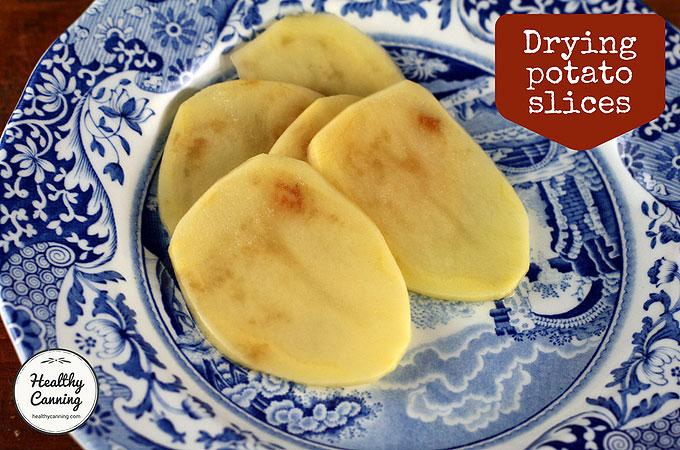
In every large batch of potatoes you process, you’re likely to get a few with brown spots in them. These spots will turn black when dried.
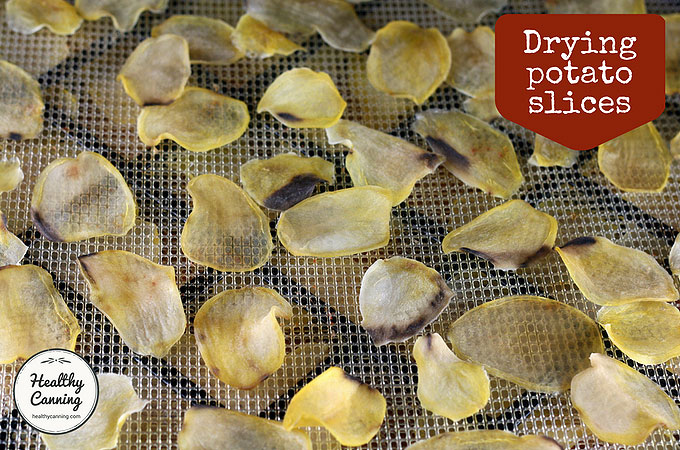
Unsightly black spots. Just take a pair of scissors and trim them off (and discard the black bits.)
Storage
Let the dehydrated product cool completely to room temperature before packing it into storage containers.
Watch the sealed containers for the first few days for any sign of condensation. If condensation occurs, dehydrate a bit more.
Label jar with name of product and date. Store away from heat and direct light.
Usage notes
Use in soups, stews, casseroles, potato dishes such as scalloped potatoes or gratin potatoes. Here’s a Scalloped Potato Dry Sauce Mix to use with these potato slices.
References

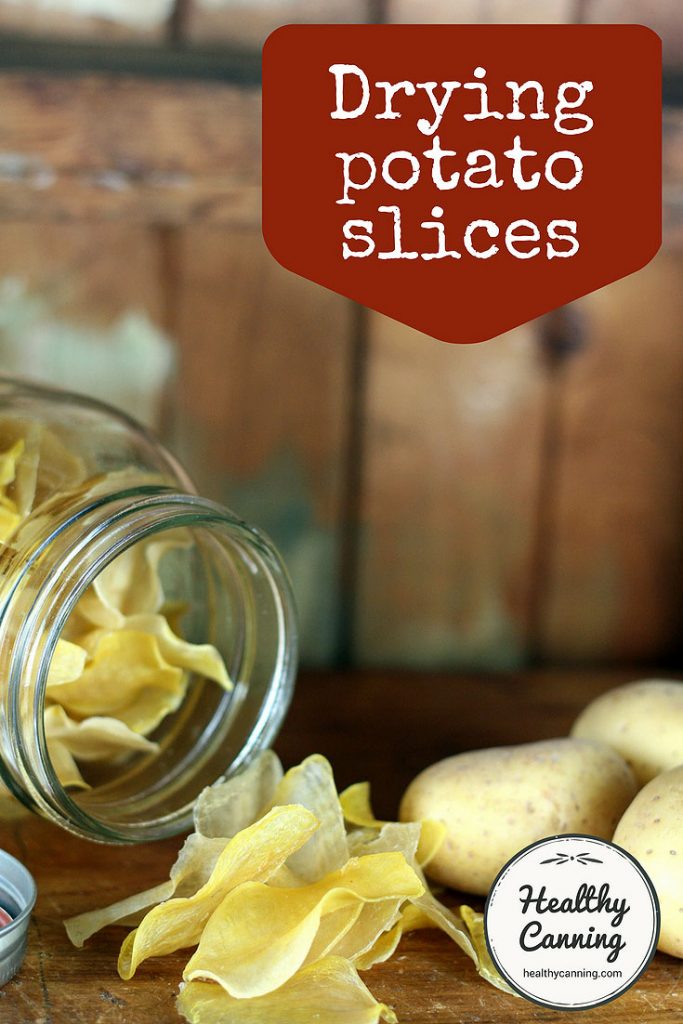
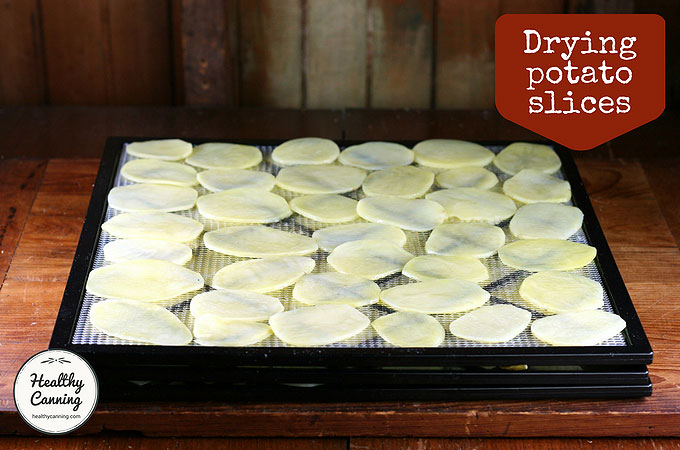
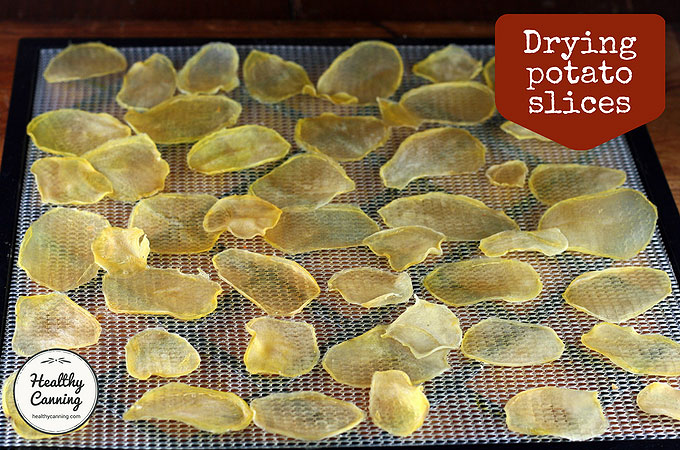
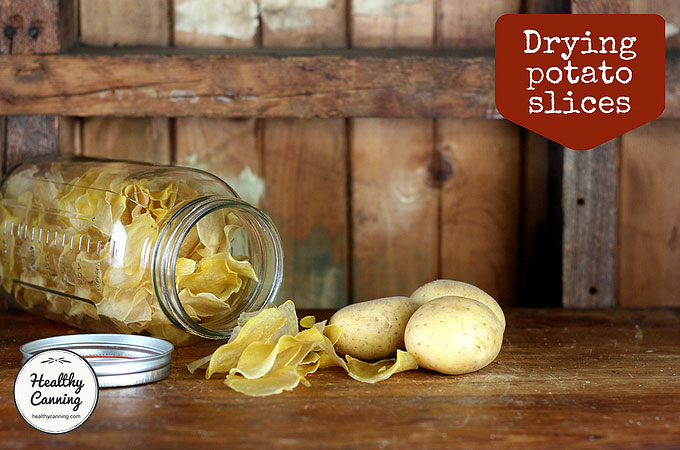
Ron
Love doing this. It’s easy. Also you can make meals ahead of time. Like I said, real easy and just having a dehydrator and mason jars for storage : simple. Enjoy.
Greta
I’ve dehydrated potatoes with and without adding citric acid to the water blanch, and adding the citric acid definitely helps. The potatoes are crisper and have no discoloration at all. I blanch the slices and then lay them out on a tea towel to remove excess moisture before putting the slices in the dehydrator. Great results.
Shauna Fleming
Greta, You say that you dehydrate potatoes. Have you found one type of potatoes better to dry than others? should I do red or russett or yukons?
Jimmie McCain
Thank you!